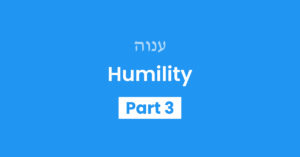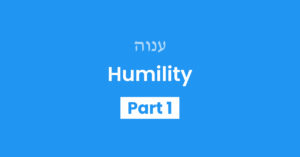Last week, we saw how the foundation of humility is understanding that all of our strengths, talents, and skills were given to us by Hashem, and it would be a mistake to take credit for them ourselves. Recognizing this truth prevents us from feeling haughty and boastful, and rather elicits a sense of responsibility to use our strengths and gifts for fulfilling Hashem’s Will.
Although these thoughts relate to how a person sees himself vis-a-vis Hashem, they have a strong impact on how a person sees himself vis-a-vis other people, too.
Just as Hashem gave me a unique set of strengths and talents, I can recognize that Hashem gave a unique set of talents to every other person in the world, too. Your friend might not be as smart as you are, but he might be stronger or more athletic. Your friend might not be as outgoing as you are, but she might be more relaxed. Your friend might not be as good at playing piano as you are, but she might have a beautiful voice. Just as your own strengths can be used for serving Hashem, your friend’s talents can also be used for serving Hashem – albeit in a different way.
Just as your own strengths can be used for serving Hashem, your friend’s talents can also be used for serving Hashem.
Last week, we offered a parable of a king who gave $100,000 to his servant to go buy a precious jewel. Now imagine that the king becomes critically ill and gives $50 to a different servant to buy a certain medication. Is the servant carrying $100,000 any greater than the one carrying $50? Not at all. They are each just serving the king in different ways. Each servant has a unique mission to fulfill, and both are highly important in the kings eyes.
So too, Hashem gave each of us different strengths – one person was given a great voice, another person was given a high IQ, and someone else was given lots of physical stamina. Each of these strengths are tools we are supposed to use for serving Hashem, our King.
Your friend with the great voice can use it for singing Shabbos zmiros or recording songs to inspire others. Your friend the genius can use his brilliance to learn Torah and pasken difficult shaiylos. Your neighbor with the outgoing personality can use it to do lots of hachnosas orchim and make people feel comfortable. Your cousin with the huge muscles can use his strength to help people build sukkahs. We are all working to serve Hashem in different ways.
Having humility means recognizing that my own strengths do not make me any greater than anyone else.
Having humility means recognizing that my own strengths do not make me any greater than anyone else.
Every person is precious to Hashem. My greatness is not determined by what talents I was given; rather, it is determined by how well I use those talents for serving Hashem and maximizing my G-d-given potential.
Flipping Your Perspective
The Sifsei Chaim1 points out that we are all naturally inclined to blow our own positive qualities out of proportion, and minimize (or even totally overlook) the good qualities in other people. But when it comes to our faults and mistakes, we do the exact opposite; we minimize our own faults as if they are nothing, and we blow up other peoples faults out of proportion.
In order to develop humility, we need to do the exact opposite: Spend less time inflating our own egos, and more time focusing on the good in other people.
Spend less time inflating our own egos, and more time focusing on the good in other people.
Similarly, the Ramban writes2 that every time we encounter another we should think: “How is this person greater than I am?”
This week, let’s practice focusing on the good qualities in other people, and remembering that I’m not any greater than anyone else; each person is great in a different way.
Sources: [1] Sifsei Chaim Middos V’Avodas Hashem, Vol. 1 pg. 336; [2] Iggeres HaRamban
Your Challenge
Compliment another person by pointing out a good quality, middah, strength, or talent that you see in them.
Torah Questions
- About whom is it said: “…So that his heart should not became haughty over his brothers” (Devarim 17:20)?
- What is this person commanded to do, in order to prevent his heart from becoming haughty?
- What did Avraham say that expressed his humility? (See Bereishis 18:27)
- What did Dovid Hamelech write in Tehillim Chapter 22 that expressed his humility?
- What did Yonatan say to Dovid that demonstrated his humility? (See Shmuel Alef 23:17)
- Humility is one of the 4 qualities necessary for someone to receive prophecy. What are the other 3 qualities? (See Nedarim 38a)
- The Gemara (Kiddushin 71a) says that Hashem’s 42-letter name is only taught to someone who is humble and has certain other qualities. Name at least 1 of the other qualities.
- In the order of the Mesilas Yesharim, which middah comes before Anavah, and which middah comes after it? (Or see the Gemara Avodah Zarah 20b)?
Questions to Ponder
- Why do you think we have an easier time noticing the good in ourselves than noticing the good in other people?
- What factors make it difficult for us to notice the good in other people?
- The Gemrara (Brachos 6b) says that a person who davens consistently in the same place every day is called “humble” and ”pious” when he dies. What does having a consistent place for davening have to do with being humble?
- The Gemara (Shabbos 30b) says that a person should always be humble like Hillel and not a kapdan (overly-exacting person) like Shammai. Why is a kapdan the opposite of a humble person?
- The Gemara (Eiruvin 13b) says that when it comes to halachah, we follow Beis Hillel’s opinion, because Beis Hillel was more humble than Beis Shammai. Why is humility so very important? Why doesn’t Hashem prefer that we follow whoever is the smartest or has the greatest memory?




